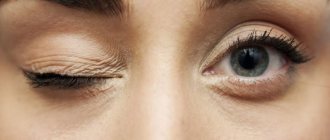What it is?
Eye tic in neurology is when both eyelids contract or the muscles of both eyes contract strongly. This name is often confused with myokymia of the eyelid - involuntary contraction of the upper or lower eyelid (orbicularis oculi muscle). Both syndromes are hyperkinesis. That is, temporary or permanent contraction of fibers in the muscles. Myokymia is characterized by painlessness, lower amplitude, and frequency of twitching. It is rarely associated with the appearance of serious diseases and often accompanies overwork and stress.
Reviews about the treatment of nervous tics
Therefore, if you or your loved ones have a manifestation of this disease, it is worth visiting a specialist within a reasonable time to establish the correct diagnosis. But before that, it is advisable to read reviews about the treatment of nervous tics, of which there are now many on the Internet. This will help you choose the right clinic and doctor. You can also get acquainted with the most common signs of the disease and methods of its treatment on the Internet. However, this information should be taken for informational purposes only. After all, this problem should only be resolved by a qualified specialist, and in serious cases you should not hesitate to contact him. And it is especially important not to self-medicate and not to rely only on information from the Internet and advice from friends if a child develops a nervous tic. In this situation, if its manifestations do not disappear on their own, after a few days and after proper rest, it is worth consulting a doctor within a reasonable time. In this case, you should be especially careful when choosing a specialist and a medical institution. Otherwise, unqualified treatment and diagnosis can significantly harm the growing body.
In addition, regardless of who suffers from a nervous tic - an adult or a child, you should not blindly believe advice from the Internet or reviews of friends and acquaintances. After all, the causes of this disease are different in each case, and each organism is unique. Therefore, if the disease does not go away on its own after rest or a change of environment to a calmer one, it is worth visiting a doctor. Moreover, this problem may be a symptom of a very serious disease that requires immediate medical attention. And the manifestations of tics can sometimes turn out to be very significant and dangerous, which only a specialist can cope with.
How does this happen?
Due to vigorous activity near computers or phones, books, which requires the work of the facial muscles of the eyes, forehead and face as a whole, the eyes become very tired. This happens to such an extent that the neurotransmitters responsible for muscle function cease to be synthesized correctly. That is, chemicals do not transmit impulses from neurons to muscle tissue. The eyelid begins to twitch. Disruption of neurotransmitters is associated with stress and fatigue, and people often notice this. If the day turns out to be unpleasant, then the eye will definitely begin to twitch. Myokymia can be caused by some antipsychotics and nervous system stimulants in combination with difficult life events.
Nervous eye tic
Nervous eye tics are involuntary eye movements. They represent blinking, winking and similar actions. All these movements occur without the control of the person himself. However, some of them may resemble actions that occur when a foreign body enters the eye or certain types of eye diseases. Therefore, if signs of this disease appear, the doctor should rule out the presence of similar diseases in the patient, since it is known that sometimes the causes of a nervous tic of the eye may not be psychological, but caused by a malfunction of the organ of vision.
Nervous eye tic in an adult
A nervous tic of the eye can occur in an adult. It often presents as involuntary blinking or twitching. Most often, in adult working age, all this occurs due to extreme fatigue or stress. In addition, it can be caused by certain diseases of the nervous system, eyes and infections.
Nervous eye tic in a child
Nervous eye tics in a child in the modern world are considered to be a very common problem. Its manifestations are often very similar to the symptoms of the disease in adults. Moreover, its main cause is also serious overwork. Today's children are very busy with school lessons, as well as activities in clubs and sections. Excessive stress can lead to stress and tics. Also, their active passion for computers now plays an important role in the development of this problem among children. Watching videos and playing computer games for a long time contributes to severe fatigue of the eyes and brain, which sometimes leads to this disease. In addition, many children today experience stress, fear and neurosis due to watching television shows and movies with scenes that frighten them. Also, when such a tic appears, one should not exclude an unhealthy psychological environment at home or at school, kindergarten. Many children and teenagers painfully endure family quarrels, as well as ridicule from classmates or remarks from teachers and educators.
Treatment of nervous eye tics
Treatment of nervous eye tics is not indicated in all cases. Often it goes away on its own and without a trace after a long rest. Reducing the time spent at the computer, as well as alternating work and rest modes, will help improve your condition. You may also need to consult a psychologist to relieve stress. In addition, in some cases, when the cause of this condition is an eye or eyelid disease, treatment of the underlying disease will help.
When should you worry?
You should not worry if myokymia, a nervous tic of the eye, is not accompanied by other symptoms. Its very rare occurrence, or its occurrence for several days in a row, although no diseases are detected, can be considered the norm. Sometimes this can last for several years. In this case, the body requires unloading. You need to listen to him carefully and change your daily routine. Spend time outdoors, engage in quiet, relaxing activities, and take your mind off the daily hustle and bustle. But if myokymia appears along with poor health or fever, soreness, movements of other parts of the face, this may indicate a malfunction of the thyroid gland, lack of vitamins, multiple sclerosis and encephalitis. You need to be examined by a neurologist, ophthalmologist and psychologist.
causes and symptoms of eyelid twitching
What does it mean when your right eye twitches?
There are physiological reasons why a nervous tic may appear under the right organ of vision. These include tension, stress, as well as any other external factor, when eliminated, muscle twitching goes away on its own.
But there are cases when a symptom is formed in connection with a serious pathological disease. If it is detected in the early stages, the possibility of a complete cure for the patient is high.
People who believe in omens believe that a nervous tic does not cause a physiological reaction or disease. They believe that the symptom indicates an early acquisition. It could be a large sum of money, a good day, a new friend. Possible promotion at work, improvement in studies.
Possible reasons
Most often, a “nervous tic” of the eyelid causes:
- diseases of the nervous system that are inherited,
- lack of sleep - muscles do not have time to recover, which leads to their overstrain,
- overwork as a result of lack of sleep or hard work,
- stress (situations that require an immediate solution, leaving the comfort zone increases the level of adrenaline, and the muscles involuntarily contract,
- alcohol abuse, which can cause muscle spasms and interfere with the interaction of fibers and neurons,
- abuse of energy drinks, coffee, tea, chocolate - muscles quickly react to any irritants.
Causes of nervous tics
Almost all causes of nervous tics are associated with disorders of the brain. But this problem arises for a variety of reasons. This imbalance can occur due to various factors, which experts divide into primary, secondary and hereditary.
The primary causes of a nervous tic can be such as: frequent stress, increased nervousness, severe fatigue, mental trauma, and the like. Secondary causes of the disease are caused by the underlying disease, which can have a negative effect on the nervous system. These are some infectious diseases, head injuries, mental illnesses, brain tumors, carbon monoxide poisoning, vegetative-vascular dystonia, birth injuries and other diseases. Also, the occurrence of a tic can be caused by diseases in which the patient was forced to make certain movements, and then they began to manifest themselves as a tic.
In addition, certain types of tics can be hereditary. They appear in children in whom one of the parents suffered from a similar illness. In this case, the problem begins to manifest itself in preschool age, and over time its manifestations may decrease or the malaise disappears altogether.
Prevention and treatment
Knowing the reasons, it will be easier to cope with a twitching eyelid and prevent the situation from worsening. Here are some simple options:
- give the body the right amount of time to rest and recover, organize sleep correctly,
- drink less caffeinated drinks, it is better to replace them with water,
- try not to create or enter into stressful situations, but treat everything calmly and judiciously,
- do gymnastics for the eyes,
- give your eyes a rest between activities,
- do not drink alcohol,
- properly organize the workplace, adjust the light and ventilate the room.
treatment of myokymia
In some cases, these simple steps will be enough to get rid of the problem. But if this does not bring any results, you need to consult a doctor. Together with him, undergo examinations of the nervous system, vision, and internal organs, after which he will select the appropriate treatment (medicines, lifestyle adjustments, lenses, glasses). You should contact a specialist in any case, as self-medication can worsen the situation.
Actions at home
If the eyelid twitches, immediate treatment should be started. Before contacting a specialist, you should follow a number of simple recommendations. In most cases, they help get rid of an unpleasant symptom without visiting a doctor.
You need to take a day off if your eye twitches all day. Treatment in this case involves rest. You need to get a good night's sleep. Most of the weekend should be spent outside. Under no circumstances should you watch TV or sit in front of a computer. It is also worth giving up reading on this day.
In the following days, you need to reduce your consumption of coffee or other tonic drinks as much as possible. Alcohol is contraindicated. Some people find that alcoholic drinks have a sedative effect. But in this case, alcohol will only worsen the situation.
Stress should be avoided. Of course, this is not always possible. But it’s still worth pulling yourself together and abstracting yourself from the situation at work, thinking about something pleasant. You can turn to gentle traditional medicine. They can have a calming effect on the nervous system. You need to monitor your emotional state. Strong outbursts of emotions, both negative and positive, are now contraindicated.
You need to perform special gymnastics for the eyes. This will improve blood circulation. The eye muscles will also become stronger. You should definitely include nuts, cereals, pumpkin seeds and whole grain bread in your diet. These foods contain large amounts of magnesium.








